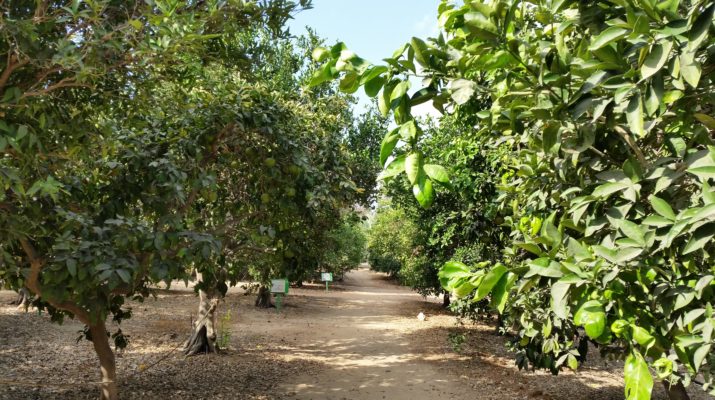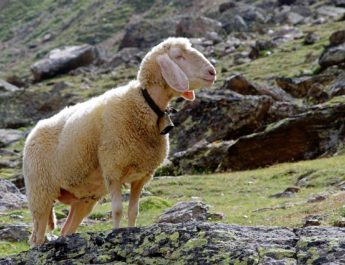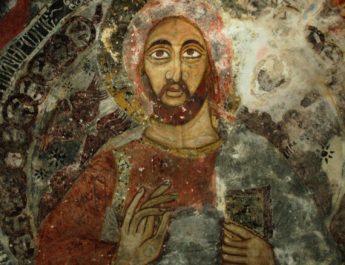Joshua 5:9-12
Lent C18
9 The LordA said to Joshua,B “TodayC I have rolled awayD from you the disgraceE of Egypt.”F
A “Lord” = YHVH. From havah (to be, become) or hayah (to come to pass, become, be). This is the name of the God of Israel, the self-existent and eternal one, the tetragrammaton. This pronunciation has been lost to time so “Lord” is generally used in its place.
B “Joshua” = Yehoshua. Related to “Lord” in v9. From YHVH (see note A above) + yasha (to deliver, defend, help, preserve, rescue; properly, to be open, wide or free, which implies being safe. So, in a causative sense, this is to free someone). This is Joshua, Jeshua, or Yehoshua, which means “the Lord is salvation.”
C “today” = yom. Root may mean being hot. This is the day in a literal or figurative sense. It can also mean birth, age, daylight, continually or other references to time.
D “rolled away” = galal. 18x in OT. This is to roll, roll away, wallow, commit, remove. It is rolling in a literal or figurative sense.
E “disgrace” = cherpah. From charaph (to expose and so figuratively to reproach, defame, carp at, defy). This is reproach, rebuke, shame, or disgrace. It can also refer to genitals.
F “Egypt” = Mitsrayim. Perhaps from matsor (besieged or fortified place, bulwark, entrenchment; something hemmed in; a siege or distress or fastness); from tsur (to confine, besiege, to cramp). This is Egypt.
And so that placeG is calledH GilgalI to this day.
G “place” = maqom. From qum(to arise, stand, accomplish, establish, abide; rising against, getting up after being sick or asleep, arising from one state to another, becoming powerful, or rising for action; standing in a figurative sense). This is a standing, which is to say a spot or space a place. It can also refer to a locality or a physical/mental condition. HaMaqom is also a Jewish name for God – the place, i.e. the Omnipresent One.
H “called” = qara + shem. Qara is to call or call out – to call someone by name. Also used more broadly for calling forth. Shem may be from sum (to put, place, set). This is name, fame, renown. A name was thought to indicate something essential about a person – something about their individuality. So, this word can also mean honor, authority, or character.
I “Gilgal” = Gilgal. Related to “rolled away” in v9. From galgal (wheel, wagon, whirl, whirlwind; something that rolls); from galal (see note D above). This is Gilgal – perhaps circle of stones.
10 While the IsraelitesJ were campedK in Gilgal they keptL the passoverM in the evening
J “Israelites” = ben + Yisrael. Literally, “children of Israel.” Ben is from banah (to build or obtain children). This is son, age, child. It is son in a literal or figurative sense. Yisrael is from sarah (to persist, exert oneself, contend, persevere, wrestle, prevail) + el (God or god). This is Israel, meaning God strives or one who strives with God; new name for Jacob and for his offspring. This refers to the people and to the land.
K “camped” = chanah. This is decline, bending down, or living in tents. It can be camping to create a home or camping as a part of battle.
L “kept” = asah. This is to make, do, act, appoint, become in many senses.
M “passover” = pesach. From pasach (to stop, pass over, skip over, to spare). This is Passover – used for the feast, the lamb of sacrifice, the day, and the festival itself. It means exemption.
on the fourteenthN day of the monthO in the plainsP of Jericho.Q
N “fourteenth” = arba + asar. Arba is from raba (to make square or be four-sided). This is four. Aar is ten or -teen.
O “month” = chodesh. From chadash (to renew, repair). This refers to a new moon. It can also mean monthly.
P “plains” = arabah. From the same as arab (desert plateau, Arabia) OR from arab (to become evening); {from ereb (evening) or from arab (to exchange, give or take on pledge, braid, intermix)}. This is a desert valley or plain, wilderness. Also, the name of a place Arabah.
Q “Jericho” = Yericho. From yareach (moon); {from the same as yerach (month)} OR from ruach (small, breathe, perceive, anticipate, accept, enjoy). This is Jericho meaning either “moon city” or “fragrant place.”
11 On the day after the passover, on that veryR day, they ateS the produceT of the land,U unleavened cakesV and parched grain.W
R “very” = etsem. From atsam (vast, numerous, strong; to close one’s eyes, to make powerful; to break bones). This is self, life, strength, bone, or substance.
S “ate” = akal. This is to eat, devour, burn up, or otherwise consume. It can be eating in a literal or figurative sense.
T “produce” = abur. 2x in OT. From abar (to pass over, pass through, or pass by; cross over or to alienate; used for transitions). This is yield or produce.
U “land” = erets. Root may mean to be firm. This is earth, ground, field land, or country.
V “unleavened cakes” = matstsah. From matsats (to drain out). This is unleavened bread – bread that is sweet rather than becoming sour with the flavor of yeast. Can also be used to refer to the festival of Passover, the staple food of which is commonly transliterate matzoh from this word.
W “parched grain” = qalah. 4x in OT. This is to roast, toast or parch – to dry or scorch in part.
12 The mannaX ceasedY on the day they ate the produce of the land, and the Israelites no longer hadZ manna; they ate the cropsAA of the land of CanaanBB that year.CC
X “manna” = man. 14x in OT. From mah (what, how, how long, why – a question or exclamation). This is manna, literally a whatzit.
Y “ceased” = shabath. This is to rest, stop, repose, cease working. By implication, it is to celebrate.
Z “had” = hayah. Related to “Lord” and “Joshua” in v9. See note A above.
AA “crops” = tebuah. From bo (to come in, go in, enter). This is produce, increase or gain – can be literal or figurative.
BB “Canaan” = Kna’an. From kana’ (to be humble, subdue; properly, bend the knee). This is Canaan, his descendants, and the land where they settled. This could mean lowlands, describing their land or subjugated in reference to being conquered by Egypt. See https://en.wikipedia.org/wiki/Canaan
CC “year” = shanah. From shana (to change, alter). This is a year, age, old. It can also mean yearly.
Image credit: “The orchard site in Rehovot” in Israel by Ariel Manor, 2015.




